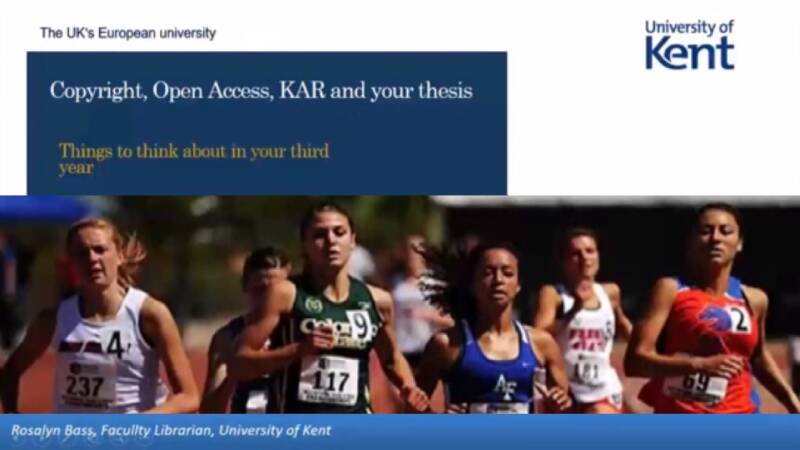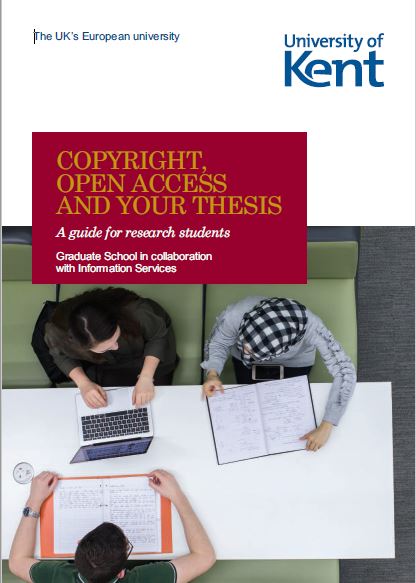Copyright, Open Access, Kar and your thesis - a presentation by librarian Roz Bass
Summary guide
Preparing your document
Before you deposit, you must make sure your document is in the correct format.
You may need to redact parts of your thesis if it:
- contains other people's work which you don't have the right to use
- contains sensitive or confidential material.
If you have data, diagrams, maps, multimedia items or any other documents you can't incorporate into the body of your thesis, check how to prepare and deposit this material.
Decisions you need to make
You need to decide:
- if you need to deposit a redacted version of your thesis as well as the full version.
- if you wish to apply an embargo because you are planning to publish it
- if your thesis cannot be publicly available because it contains a lot of sensitive or confidential material. At an early stage, before publication, you should discuss with your supervisor whether there is potential commercial application to your work or any patentable subject matter. Please contact commercialisation@kent.ac.uk for advice as early as possible.
- which Creative Commons licence to apply to your thesis.
How to deposit your thesis into KAR
You deposit your thesis through your school’s Moodle page. Your school will send you the link and you will need to follow these steps.
Watch this Depositing your thesis to KAR via Moodle video
If you've been awarded your PhD on the basis of published works, you can still record it on KAR.
How having your thesis in KAR affects you
KAR is Kent’s Open Access institutional archive, through which your thesis is publicly available and downloadable.
- This has many benefits to you, as listed below.
- You will keep ownership of the copyright of your work.
- It will not affect your ability to publish if you choose the right access option.
Document list
Benefits of KAR
When your thesis is available in the Kent Academic Repository (KAR) the full text will be available over the internet. This is called Open Access.
Open Access refers to online material that is free at the point of access, so anyone can read it without needing to pay. Open Access material allows readers to use and share information easily; it has clear re-use rights which tell others what they are allowed to do with it.
Making your thesis Open Access:
- increases the visibility and reach of your research. Your thesis will appear prominently in search engine results and authoritative online sources such as the British Library’s EThOS service.
- means your research is more likely to be read and cited.
- provides a stable, long-term URL you can use to promote your work. You can refer potential collaborators, employers and grant providers to your research, and track any citations.
- allows long-term preservation of your research and ensures it is accessible.
- protects you against plagiarism, as a reference copy is publicly available.
- means you can see how often your thesis is downloaded.
- satisfies the Open Access requirements of funding bodies, such as RCUK.
PhD based on published works
If you are undertaking a PhD by published works you must meet with the IS Research Support team. Contact researchsupport@kent.ac.uk to make an appointment.
If you have been awarded your PhD on the basis of a collection of published works rather than a single thesis, you can still record the basis of the award on the Kent Academic Repository (KAR).
Your KAR deposit has to include these three elements:
- a record in KAR for each of the publications that form the basis of the award - see part 4 of the regulations
- the summary or supporting statement you had to create for the PhD - see part 6 of the regulations
- a bibliographic list of the publications.
In KAR, each publication record will link to the thesis record and vice versa. See an example record in KAR.
Record of the publications in KAR
- Create a full record for each publication on KAR with links to the publisher's pages for the work. Where possible, upload a compliant copy of the full-text (pdf) to the record. If that's not possible, the link to the publisher's page will allow others to access the work.
- You can use the Assisted Deposit Service to send us your journal articles or conference proceedings to upload to KAR for you. It will help you meet publisher requirements and upload the correct version of your work.
- To find out more about journal publisher copyright policies, use Open Policy Finder.
- Each record will have its own URL in KAR (which will look a bit like this: https://kar.kent.ac.uk/69412/). Add these URLs to the bibliographic list.
Summary or supporting statement
- If you have included published versions of your work (as they appear on the publisher’s website with the publisher’s typesetting, fonts, formatting logo, etc) that have not been made available under a Creative Commons licence, you should redact this material from your thesis and deposit the full version and a redacted version.
- Upload the supporting statement to KAR via Moodle like any other thesis deposit. Select the 'PhD based on published works' option in the Thesis/Dissertation Type section.
- It should be accompanied by the bibliographic list of the publications that form the main evidence for the award.
Bibliographic list
- Lay this out in the correct referencing style for your discipline.
- Add the URL of the KAR record for the publication to each entry.
- Upload this document to KAR via Moodle like any other thesis deposit, either as a separate document or as part of the summary or supporting statement.
Contact us
If you are depositing a record for this type of PhD, contact researchsupport@kent.ac.uk.
Help
- KAR and Open Access: email researchsupport@kent.ac.uk
- Copyright: email copyright@kent.ac.uk
- Choosing the best deposit option for your thesis: speak to your supervisor and the Submission Review Panel

